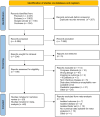Neuroimaging for prognosis of central nervous system infections: a systematic review and meta-analysis
- PMID: 40670885
- PMCID: PMC12267735
- DOI: 10.1186/s13613-025-01516-1
Neuroimaging for prognosis of central nervous system infections: a systematic review and meta-analysis
Abstract
Background: Central nervous system (CNS) infections carry a severe prognosis and often require intensive care unit (ICU) admission. This study evaluated the prognostic value of neuroimaging in patients with all-type CNS infections.
Methods: Using a predefined strategy, we first conducted a systematic search of PubMed/MEDLINE, PubMed Central, Embase, Cochrane and Google Scholar. Eligible studies published between January 1st, 2000, and June 1st, 2023, were included. We considered randomized controlled trials, non-randomized trials, cohort studies, excluding abstracts, cost-effectiveness analyses, letters, conference proceedings, systematic reviews, and meta-analyses. Two authors independently screened publications and extracted data. The meta-analysis was performed using a random-effects model. The main outcomes were (1) unfavorable outcome, defined as severe functional disability or death, and (2) mortality. Pooled odds ratios (OR) and 95% confidence intervals (95%CI) were calculated for each neuroimaging feature. We performed prespecified subgroup analyses depending on type of CNS infection (bacterial meningitis, CNS tuberculosis, CNS cryptococcosis, viral encephalitis, and brain abscess), country income, and ICU admission status.
Results: Of 7,864 studies identified, 83 met the inclusion criteria, with 48 studies (6,434 patients) included in the meta-analysis. Abnormal MRI (OR: 3.55; 95%CI: 1.81-6.96; I²=0%), brain ischemia (OR: 4.65; 95%CI: 3.14-6.88; I²=28.5%), and hydrocephalus (OR: 4.56; 95%CI: 2.49-8.36; I²=61.5%) were significantly associated with unfavorable outcome. Hydrocephalus (OR, 3.99; 95%CI 1.83-8.70; I²=61%) and brain ischemia (OR, 3.51; 95%CI, 2.22-5.54; I²=16.4%) were associated with mortality. These associations remained consistent in patients with bacterial meningitis and in patients with CNS tuberculosis, but not in other CNS infections. Subgroup analyses depending on country income and ICU admission status revealed similar findings.
Conclusion: Neuroimaging provides essential prognostic information in patients with CNS infections. Abnormal MRI findings, cerebral ischemia, and hydrocephalus are associated with unfavorable outcome, particularly in bacterial meningitis and CNS tuberculosis. These neuroimaging features should be considered when discussing prognosis in affected patients.
Keywords: Autoimmune; CNS infection; Encephalitis; Functional outcome; Intensive care; Meta-analysis; Mortality; Neuroimaging; Outcome.
© 2025. The Author(s).
Conflict of interest statement
Declarations. Ethics approval and consent to participate: Not applicable. Consent for publication: Not applicable. Competing interests: None. Funding: None.
Figures




References
-
- an de Beek D, Cabellos C, Dzupova O, Esposito S, Klein M, Kloek AT, et al. ESCMID guideline: diagnosis and treatment of acute bacterial meningitis. Clin Microbiol Infect. 2016;22:S37–62. - PubMed
-
- Sarrazin JL, Bonneville F, Martin-Blondel G. Brain infections. Diagn Interv Imaging. 2012;93(6):473–90. - PubMed
-
- Auffray-Calvier E, Toulgoat F, Daumas-Duport B, Lintia Gaultier A, Desal H. Infectious and metabolic brain imaging. Diagn Interv Imaging. 2012;93(12):911–34. - PubMed
-
- Bhimraj A, Hasbun R. Diagnostic approach and update on encephalitis. Curr Opin Infect Dis. 2022;35(3):231–7. - PubMed
-
- Sonneville R, de Montmollin E, Contou D, Ferrer R, Gurjar M, Klouche K et al. Clinical features, etiologies, and outcomes in adult patients with meningoencephalitis requiring intensive care (EURECA): an international prospective multicenter cohort study. Intensive Care Med [Internet]. 2023 Apr 6 [cited 2023 Apr 25]; Available from: https://link.springer.com/10.1007/s00134-023-07032-9 - PubMed
LinkOut - more resources
Full Text Sources
Miscellaneous

